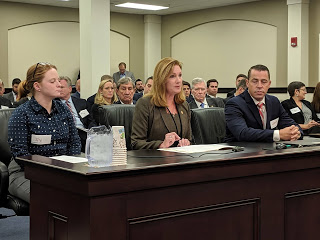Bill to help people with addictions get medication-assisted treatments moves; advocates say insurers killed the last one

Kimi Banta, Rep. Kim Moser, Dr. Shawn Ryan
—–
By Melissa Patrick
Kentucky Health News
FRANKFORT, Ky. — A bill to help people with opioid and alcohol addictions to get prescription drugs to treat their substance-use disorders — the recognized standard of drug treatment — passed unanimously out of committee Thursday and now heads to the full House.
House Bill 389, sponsored by Rep. Kim Moser, R-Taylor Mill, would ban the requirement of “prior authorization” for any prescription drug that is used in the treatment of alcoholism or opioid-use disorder that contains methadone, buprenorphine or naltrexone, which are the recommended first courses of treatment for most patients.
Under prior authorization, insurance companies require health-care providers to get the insurer’s approval for certain drugs and procedures before they can be administered.
“Your treatment could be delayed anywhere from several hours to several weeks because of the prior authorization rules that insurance companies have in place,” Moser told the House Banking and Insurance Committee. “Ultimately, your health-care provider knows what is best for you . . . but unfortunately, they are not always the ones to make the final decision.”
Starting Jan. 1, a law passed during the last legislative session gave insurers five days or less to give or deny approval of a drug, allowing some maintenance drugs used to treat chronic conditions to be approved for up to a year.
Moser, whose main job between 2014 and 2018 was Northern Kentucky director of the state Office of Drug Control Policy, talked about the dangers such delays have for people with addictions, often resulting in relapse or death from overdose.
She also said immediate access to these “life-saving treatments” is imperative because the window for when a person is ready and willing to seek treatment for addiction is often very short.
“The evidence is clear, treatment works,” she said. “It helps keep people out of jail, it helps them stay in jobs, it helps them be productive members of society and family members, but most importantly, it saves lives.”
This claim is well supported. Most recently, a study published Feb. 5 in JAMA Network Open compared six treatment plans for nearly 41,000 adults with opioid-use disorder between 2015 and 2017 and found that patients who were treated with buprenorphine or methadone were 76 percent less likely to overdose within three months and 59% less likely in 12 months, compared to those who did not get these drugs but participated in other types of treatment.
The same patients were 32% less likely to go to the emergency room or be admitted to the hospital in three months, and 26% less likely in 12 months.
Only 12.5% of the patients in the study were prescribed buprenorphine or methadone, citing a lack of access to doctors who can prescribe those drugs; high co-payments; prior-authorization requirements; “and other restrictions on use,” the study said.
Kimi Banta of Louisville told the committee that as an alcoholic and an addict in recovery, “Medically assisted treatment has saved my life.”
She said “after years and years of failed attempts to stop my drug use,” she was prescribed Suboxone, which is a combination of buprenorphine and naloxone, a drug that reverses an opioid overdose, and that has allowed her to stay sober for two years and rebuild her life.
“I am a changed person and Suboxone bought me the time to do it all,” she said. “More Kentuckians deserve this opportunity and should not have to jump through hoops to get medication that can change their life and their families life. This bill will save lives.”
Moser, who chairs the House health committee, said the bill is supported by American Medical Association, the Kentucky Medical Association, the American Society of Addiction Medicine, the Kentucky Society of Addiction Medicine and treatment providers everywhere.
KMA President Dr. Brent Wright said in a news release, “This legislation will remove a critical barrier to ending Kentucky’s ongoing overdose and death epidemic. We support this bill because it will save lives.”
A similar measure passed the House 97-0 last year, but was not given a hearing in a Senate committee. The joint KMA and AMA news release says last year’s bill “was ultimately defeated by opposition from health-insurance companies.”
Kentucky’s Medicaid program and some insurance companies have voluntarily lifted prior authorization for some medication-assisted treatments. Moser said her bill would codify this requirement for all three drugs in the Medicaid system and with private insurers.
Moser told Kentucky Health News, “There are patients who when they are ready for treatment for their addiction, they need these medications right away so that they don’t go back out and use and overdose and die — and we are seeing that. That’s why [this bill] is so critical.”